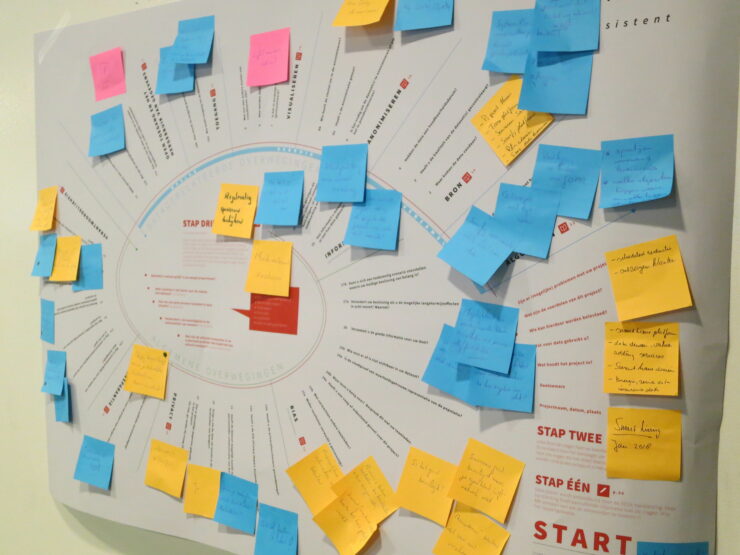News
Insights into the Data School
This text is a translation of the original publication at the Weizenbaum Institute for the Network Society.
In September 2021, Bennet Etsiwah, research associate in the research group “Data-driven Business Model Innovations” at the German Weizenbaum Institute, was a visiting researcher at the Data School (Data School). In the following report, he explains what this Dutch data school is all about and what lasting impressions he gained there.
Since 2020, our research group “Data-driven Business Model Innovations” has been in contact with Data School. At that time, project leader Dr. Mirko Schäfer was a guest on our podcast series Voices for the Networked Society and presented the work of the data school, among other things. In the conversation with our podcast host Ana Burgueño Hopf, it became clear very quickly that our research interests overlap – especially with regard to topics such as datafication and data literacy. What was particularly exciting about this was the change of perspective: while our research group reflects on these topics primarily in entrepreneurial contexts, the Data School perspective is characterised by a strong media studies perspective.
Entrepreneurial research as a paradigm
This perspective is also reflected in the structures of the Data School, as the project is based in the Department for Media and Culture Studies at Utrecht University. In a series of projects and across different departments, Data School staff are dedicated to training students and practitioners in the use of digital methods and empowering them to critically analyse data. In addition to traditional teaching, the data school places special emphasis on applied research projects with external partner institutions – an approach that they call entrepreneurial research. The concept behind this is described in detail in Schäfer & Van Schie (2019). An important cornerstone of entrepreneurial research is that the funding of the Data School and their teaching activities are primarily connected to applied research assignments. To this end, potential data projects and research questions are identified together with actors from the field and subsequently worked on by student project groups. Numerous projects with various partners have already come about on the basis of this model. So far, these mainly include Dutch ministries, municipalities and other public administration organisations – but also companies and NGOs. A second cornerstone of entrepreneurial research at Data School is that it is based on specially developed offerings and tools. One of these tools, with which I have also been able to gain personal experience on site, is DEDA (Data Ethics Decision Aid).

DEDA – Data Ethics in Workshop Format
DEDA is a detailed canvas that is used in moderated workshops to analyse data projects with regard to their ethical and social implications (see Franzke et al., 2021). The tool is dialogue-based and guides interdisciplinary groups of 6-8 participants to discuss their own data projects. Not only technical aspects are reflected upon, but also questions about responsibility, transparency, privacy and possible biases are addressed. What is impressive about DEDA is that participants can use it to evaluate their data project in just a few hours. Simultaneously, DEDA also can be used as a research tool, e.g. to generate research data through participatory observation. For external researchers and professionals, the Data School offers train-the-trainer formats to qualify them in using DEDA. In addition, the Data School grants free use of DEDA in non-commercial contexts.

Self-awareness through intervention
The focus on practical and applied research also manifests in activities Data School organises on campus: During my visit to Data School, Karin van Es and Tim de Winkel organised a hands-on workshop to discuss the corona policy of their own university. The debate centred on guideline values for potentially harmful CO2 concentrations in classes and events spaces, which serve as a proxy for airborne particles that contain the SARS CoV-2 virus. Guided by members of Creative Coding Utrecht, participants developed simple measuring stations based on Arduinos and CO2 sensors. This informed a a subsequent discussion of possible research questions, and designs in which these tools and their measurements could play a central role. The results of this discussion, including my contribution on the topic of data walks, were published here.

Applied media studies
The two weeks in Utrecht allowed me to get to know new, exciting formats and, above all, the many people behind them, whom I would like to thank very much at this point. In my opinion, the research and exchange formats developed at Data School and their network impressively demonstrate the relevance and direct applicability of positions from the humanities and social sciences in the discourse on digitisation and datafication. Also, it is impressive how Data School curates the exchange between science and society with its research activities. Instead of relying on downstream knowledge transfer, their practice-oriented education and research formats allow direct interaction and mutual learning experiences in the field. This is accompanied not least by questions about suitable research paradigms in digitisation research, which in many cases also address inter- and transdisciplinary issues.
Literature
Franzke, A.S., Muis, I., Schäfer, M.T., 2021. Data Ethics Decision Aid (DEDA): a dialogical framework for ethical inquiry of AI and data projects in the Netherlands. Ethics Inf Technol. https://doi.org/10.1007/s10676-020-09577-5
Schäfer, M.T., van Schie, G., 2019. Data School. Eine unternehmerische Plattform für Unterricht und angewandte Forschung im Bereich der Datafizierung. ZPol Zeitschrift für Politikwissenschaft 29, 123–140. https://doi.org/10.1007/s41358-018-0166-8
Schäfer, M.T., Franzke, A., 2020. DEDA Handbook – Assessing ethical issues with regard to governmental data projects. https://dataschool.nl/wp-content/uploads/sites/425/2020/06/DEDA-Handbook-ENG-V3.1-1.pdf

